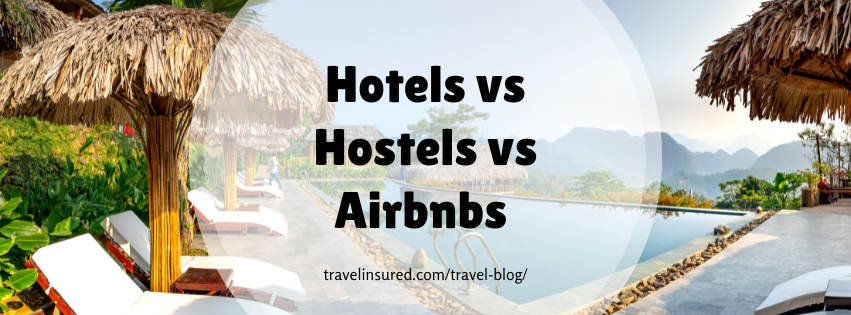by
Isabelle Raffin
| Apr 18, 2023

Discover your ideal lodging from hotels, hostels, to Airbnbs and see how incorporating travel protection might assist with unexpected travel events. Learn about accommodation options for your next trip and the benefits of considering travel insurance.
When you travel, the place that you choose for lodging can be an important decision. Hotels, hostels, and Airbnb rentals are popular options, each with unique advantages and drawbacks to consider. Below, we explore these and how travel protection can play a role in your accommodation choice.
Hotels:
Pros:
One of the main advantages of staying in a hotel is the level of service and amenities that they can offer. Hotels often have a reception desk that is staffed 24 hours a day, which means you can get help with what you need at any time. They typically offer amenities such as room service, housekeeping, and on-site restaurants, bars, and fitness centers. Hotels also often have a high level of security, with key card access to rooms and secure parking options.
Another advantage of staying in a hotel is the level of comfort they often provide. Hotel rooms are usually spacious and come with comfortable beds and pillows, high-quality linens, and air conditioning. They also often offer a range of room types to choose from, including suites, which can be great for families or groups of friends traveling together.
Cons:
One of the main disadvantages of hotels can be the cost. They are often more expensive than other types of accommodations. Additionally, hotels can sometimes seem impersonal, with a lack of character and individuality. They can also be noisy, with shared walls and lots of foot traffic in hallways.
Hostels:
Pros:
Hostels are often a popular choice for backpackers and budget travelers. They are often cheaper than hotels and can offer a more social experience. Many hostels have shared dorm rooms, which can be a great way to meet other travelers from around the world. They also often have common areas where you can hang out, cook meals, and relax.
Another advantage of staying in a hostel can be the flexibility they offer. Many hostels don't require a minimum stay, which means you can come and go as you please. They also typically have a relaxed atmosphere, which can be a nice change of pace for some travelers.
Cons:
One of the main disadvantages of hostels is the lack of privacy. Shared dorm rooms mean that you may have to share a room with strangers, which can be uncomfortable for some travelers. Additionally, many hostels don't have private bathrooms, which means you may have to share a bathroom with other guests.
Hostels can also be noisy, with lots of people coming and going at all hours of the day and night. They may have limited amenities, with few or no on-site restaurants or fitness centers. Finally, hostels can be less secure due to their communal nature.
Airbnbs:
Pros:
Airbnbs have become increasingly popular in recent years, thanks to their affordability and flexibility. They offer a range of accommodation types, from entire homes or apartments to private rooms in someone's home. This means you can choose an Airbnb that fits your budget and travel style.
One of the main advantages of staying in an Airbnb can be the local experience it provides. You can stay in neighborhoods that are off the beaten path and get a sense of what it's like to live like a local. Additionally, many Airbnb hosts are happy to provide recommendations for restaurants, activities, and sights to see in their city.
Another advantage of staying in an Airbnb is the flexibility they often offer. Many Airbnbs come with a kitchen, which means you can cook your own meals and save money on dining out. They also often have versatile check-in capabilities, potentially allowing you to come in earlier and leave later, with the option to self-check-in without the need to wait in a line at a reception desk.
Cons:
One of the main disadvantages of Airbnbs can be the lack of consistency in quality. Unlike hotels, which have a set standard of cleanliness and amenities, Airbnbs can vary widely from listing to listing. This means that you may end up in an Airbnb that doesn't meet your expectations, with issues like a dirty bathroom, uncomfortable bed, or noisy surroundings.
Another potential disadvantage of staying in an Airbnb is the lack of service and amenities. Unlike hotels, which often have on-site restaurants, fitness centers, and housekeeping services, Airbnbs may not offer any of these things. Additionally, many Airbnb hosts do not provide 24-hour support, which means you may be on your own if something goes wrong.
But, how does Travel Protection play a role in this scenario? Travel protection can enhance your stay across various types of lodging, from the full-service experience of hotels to the budget-friendly nature of hostels and the homey ambiance of Airbnbs. It offers a safeguard by potentially covering unforeseen expenses and trip disruptions, which might include cancellations or emergencies, allowing for more flexibility and support during your travels. To learn more talk to your travel advisor or visit our website.
This blog references or links to websites for the following companies, which are not affiliated with Travel Insured International or United States Fire Insurance Company: Airbnb
3480320